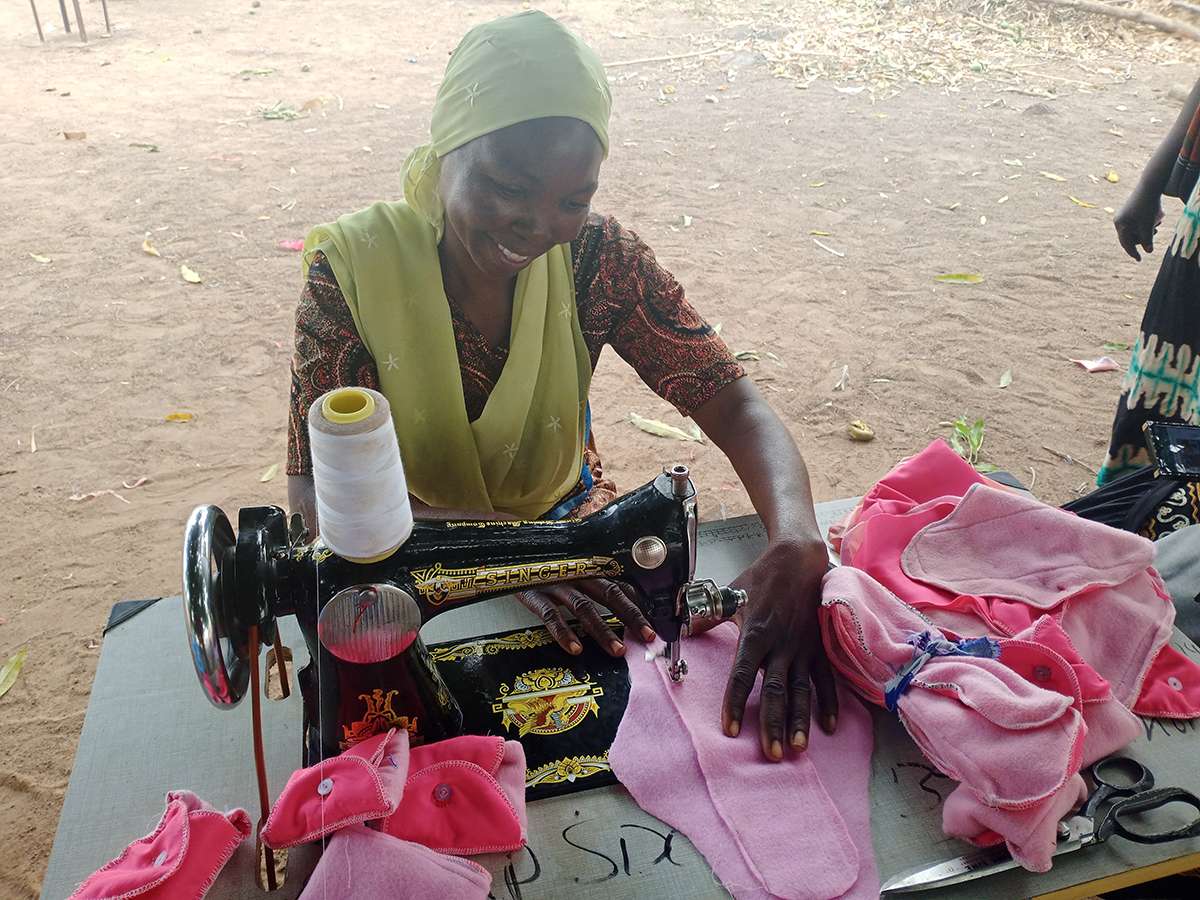
By Mary Kadi Edward
We’re celebrating Menstrual Hygiene Day, observed annually on May 28. Since its founding in 2013, the goal of this day is to break taboos and raise awareness around menstruation and menstrual hygiene, and to urge leaders to prioritize menstrual health and hygiene. To mark this day, we’re highlighting the work of our USAID Afia WASH project in advocating for menstrual health and hygiene in South Sudan.
In South Sudan, 70% of women and girls do to not have access to menstrual hygiene products. Disposable menstrual pads are often not available or too expensive for families in rural areas, forcing many young girls and women of reproductive age to use alternatives or to go without sanitary pads altogether.
The USAID Afia WASH project, implemented by DT Global, works with local communities across the country to advocate for menstrual health and hygiene and build latrines. This helps menstruating persons manage their cycles in a dignified and healthy way. As part of its activities, the project engages communities in social behavior change strategies coupled with physical activities to increase adoption of key hygiene practices. In the area of Menstrual Health Management, the Afia WASH team discourages unsanitary practices, sensitizes the community on the use of menstrual pads, and breaks taboos and stigma around menstruation.
In 2022, a group of women in Wau County formed the Eviso-Women group (meaning “something good” in the Balanda language) with the goal of bringing women together to support each other financially and mentally. The group was initially formed with a traditional savings scheme to support each other, and then later began creating reusable menstrual pads and soap to sell. The Afia WASH team began to train this group on how to create menstrual pads and liquid soap.
Afia WASH trained the group with two different sewing machines to sew and finish the reusable pads. So far, the group has produced more than 750 reusable pads using sewing machines or by hand. The reusable pads are made from waterproof materials, soft cotton flannel, and absorbent fleece materials, which offer protection and comfort while being environmentally friendly.
“In the one-month training, I was able to learn tailoring skill which I did not previously have,” said Sidonia Simon, trainee and member of the Eviso-Women group. “I thought it was hard, but I was surprised that it was not that difficult to learn. This training gave me purpose and I am happy that I was able to participate in it. The fact that we are now improving the quality of the pads and producing more is my motivation – our plan is to attempt to produce different sized for the variety of customers as well since we got feedback regarding this from them.”
Now, the Eviso-Women group is beginning to learn about how to market and sell their products. Recently, Eviso-Women, led by their Chairperson Tereza Joseph, had the opportunity to be a part of two exhibitions in South Sudan’s capital of Juba with Afia WASH’s support. At these exhibitions, the women displayed their reusable pad products, drawing interest from a wide range of visitors including women entrepreneurs. Later, the group was invited back for this year’s Sip & Shop, an annual pop-up market that supports small business communities. The market ran a re-usable pad donation drive whose proceeds went to a program that deals with vulnerable at-risk young women.
“It was my first time and Juba, and I was exposed to so much. I spoke to many women doing businesses similar to ours,” said Tereza. “I learnt a lot including the importance of marketing and basic finance and more on start-ups like ours. I am eternally grateful to Afia WASH for the opportunity we got to network with our fellow women in business.”
Tereza is determined to improve the group’s status and has shared her plans improve the quality of the pads and also to scale to bigger markets such as schools, households, and the main markets.
A woman from the community who uses these menstrual pads, shared her experience with the product. “They are affordable, long-lasting and comfortable,” she said. “I only hope that they women will be able to keep producing them – so that many of our daughters and mothers are still able to access them too. Many of us would use cloths that we pile into thick size – there are few who can afford the disposable pads. This alternative will surely be a good one.”
This initiative is just getting started. So far Afia WASH has supported this work in two counties, and it aims expand access further in the year to come. The goal is to reach as many girls and women of reproductive age as possible, improving their knowledge of and access to sanitary products and helping to break taboos and raise awareness for generations to come.